Charger Enova All-80
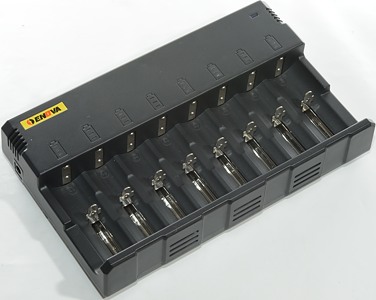
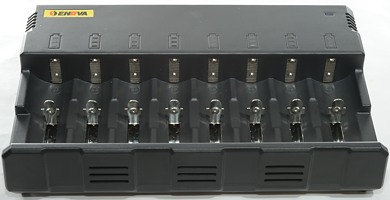
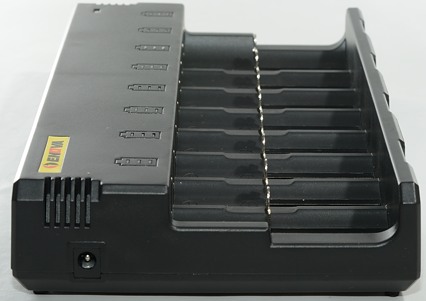
Enova has a long line of chargers with 2, 4 and 8 channels. This review is about the 8 channel charger. The charger can charge both LiIon and NiMH batteries and work as a usb power supply.
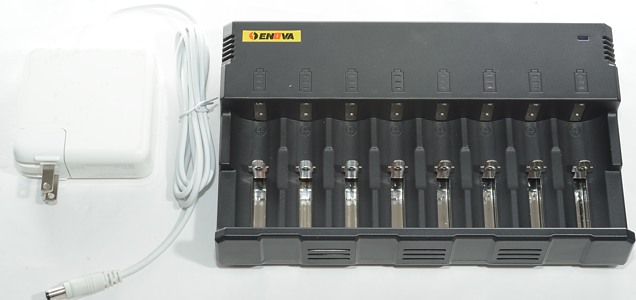
I got it without any box, only the charger and a US power supply.
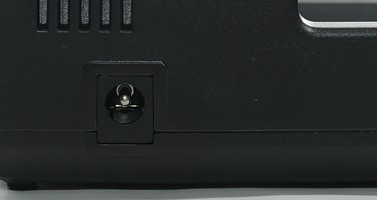
On one side of the charger is a DC connector for 12 volt input, it can be used for the mains adapter or a car adapter.
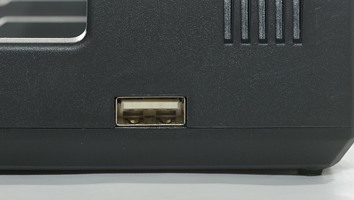
On the other side is a usb output connector for the usb power supply/charger function.
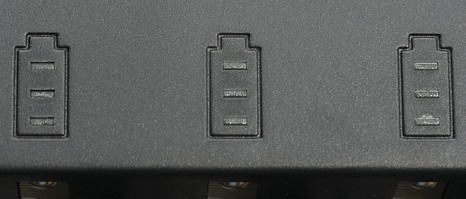
There is no real user interface on this charger, just put a battery into a slot and it will start charging.
The 3 leds for each slot gives an idea about charge status, when charging is finished all 3 will be steadily lit.
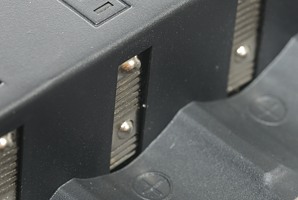
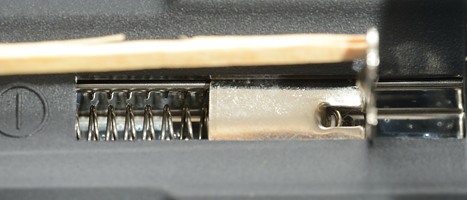
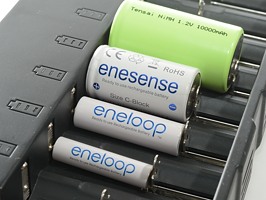
The slots can support many battery sizes, from 32mm long up to 72mm long, but the larger sizes will have a very long charge time.
When putting batteries in, it is necessary to be a bit careful to get connection due to the large diameter of the trays.

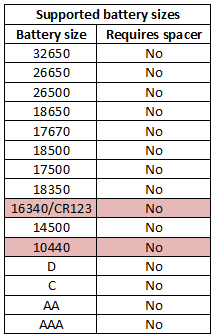
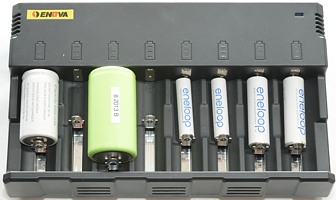
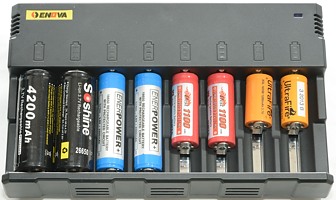
The charger can handle 72 mm long batteries including flat top cells. The specifications also list 16340 and 10440 batteries, but the current is too high for these battery sizes.
Measurements
- Below 0.35 volt the charger will apply a few mA in pulses and all 3 yellow leds will flash.
- Above 0.35 volt the charger will apply regular charge current.
- Above 2.0 volt charger assumes LiIon battery.
- Charger will restart if voltage drops to 3.9 volt.
- Charge will restart charging after power loss, or battery insertion.
- When charging is finished the charger will apply 0.18mA charge current to LiIon and 1mA to NiMH.
- When not connected to power it will drain about 0.25mA from a LiIon battery and 0.06mA from a NiMH battery.
- The charger is specified as a 4.22 volt charger with 1% tolerance, this means some copies will have to high charge voltage.
LiIon charge
%20%231.png)
This looks like a nice CC/CV charge curve with a 50mA termination. This is very good.
%20%232.png)
%20%233.png)
%20%234.png)
%20%235.png)
%20%236.png)
%20%237.png)
%20%238.png)
All the other slots looks the same way.
%20%231.png)
The 2600mAh cell takes longer to charge, due to the long CV phase.
%20%231.png)
The 3400mAh will, of course, take longer.
%20%231.png)
No problems with my old IMR cell.
%20%231.png)
Or the 18350 cell.
.png)
With 8 cells the charger uses the full current on all channels.
.png)
This means that the charger uses 2.5A from the power supply.
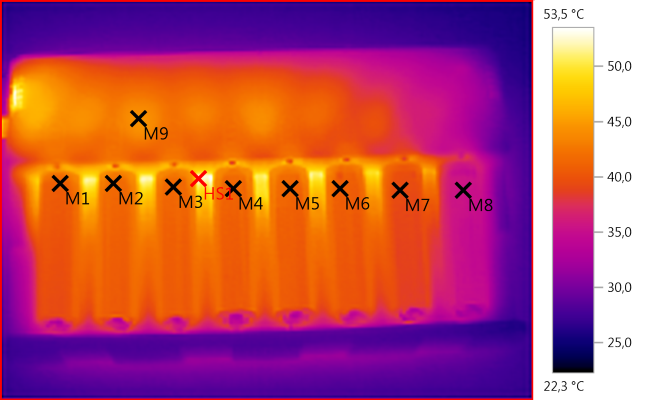
M1: 40,9°C, M2: 41,8°C, M3: 41,5°C, M4: 41,3°C, M5: 41,4°C, M6: 40,9°C, M7: 39,4°C, M8: 35,4°C, M9: 44,5°C, HS1: 53,5°C
It looks like the heat generating electronic is distributed fairly even over the width of the charger, except at the last cell. It must be because the USB output electronic is there.
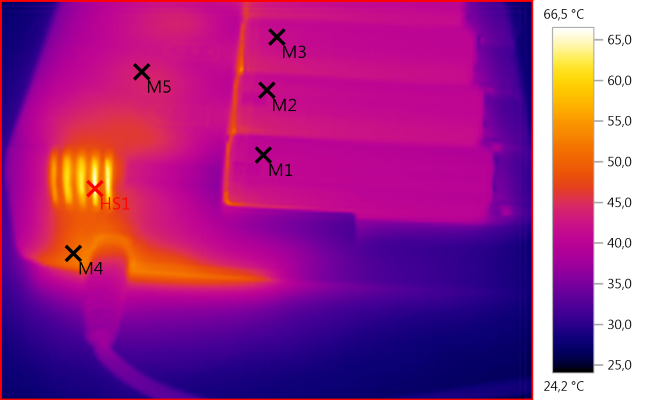
M1: 40,8°C, M2: 42,0°C, M3: 41,8°C, M4: 50,8°C, M5: 43,8°C, HS1: 66,5°C
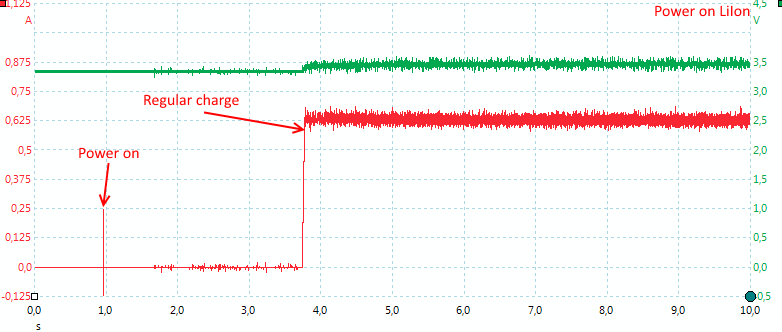
Not much happens during startup, the charger needs about 3 second before it is charging.
NiMH charge
%20%231.png)
It looks like the charger is using maximum voltage termination here and the voltage is trimmed to stop just about where the eneloop batteries are full.
The charger does not have any top-off charge after the voltage termination, this means the batteries may not be complete filled.
%20%232.png)
%20%233.png)
%20%234.png)
%20%235.png)
%20%236.png)
%20%237.png)
%20%238.png)
On some of these tracks a slight temperature raise can be seen, when the charger terminates.
%20%231.png)
The XX must have a slightly lower termination voltage and the temperature peek is more obvious.
%20%231.png)
The AAA looks the same way.
%20%231.png)
But here the termination is different, it looks like a -dv/dt termination and the temperature raise is much greater.
%20%231.png)
Detecting a full cell takes about 11 minutes with eneloops.
.png)
With 8 batteries it looks like some does voltage termination (the one I am measuring V and A on) and some might do -dv/dt termination (The one with temperature sensor on).
.png)
Charging eneloop the current consumption is lower. The steps in the current at the end, is when the different batteries are finished.
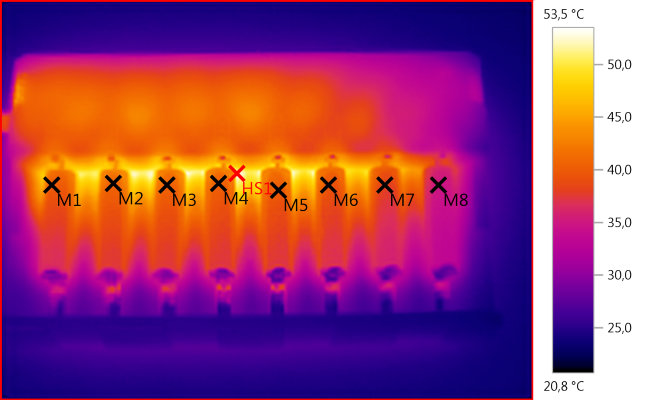
M1: 40,0°C, M2: 40,8°C, M3: 40,6°C, M4: 40,6°C, M5: 39,9°C, M6: 39,6°C, M7: 38,2°C, M8: 35,0°C, HS1: 53,5°C
Like LiIon the last battery is not heated as much.
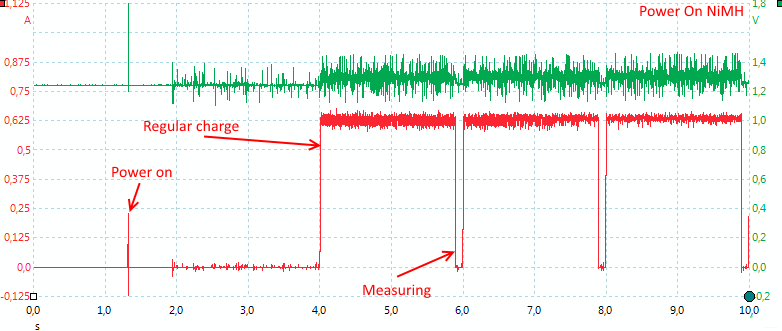
The charger starts just as fast here, but it will stop charging each other second to check voltage.
LiIon & NiMH mixed charge
Charging a mixed load of NiMH and LiIon does also work fine.
.png)
First with V and A measurement on the eneloop and temp on the LiIon.
.png)
And here the opposite way.
USB output
The usb output is powered from the 12V input, not from the batteries.
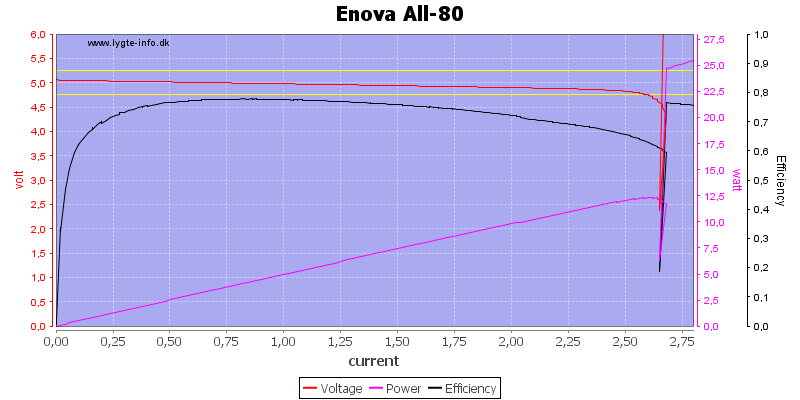
As can be seen it can deliver at bit more than 2.5A.
But it does not have any overload protection and at 2.6A it broke down and the output voltage increased to 12V permanently.
That breakdown prevented me from doing any more test on the usb.
The chargers power supply passed an isolation test with 2500 volt, but failed a 5000 volt test, this makes the it acceptable for 110VAC usage, but doubtful for 230VAC usage, being with US plug this is mostly acceptable. Usage with 12 volt (in a car) is, of course, always possible and safe.
Conclusion
The design of the charger is based on another charger, but instead of 4 slots it has 8 slots and instead of two charge circuits it has 8 charge circuits. This means the charger will charge with full current on all batteries in it. The charger uses a CC/CV algorithm for LiIon and a voltage or -dv/dt termination for NiMH.
I do not like that the usb is without overload protection and that it fails to 12 volt.
This is a fairly good charger if there is a need to charge many batteries, especially LiIon batteries.
Notes
The charger was supplied by Enova for a review.
Here is an explanation on how I did the above charge curves: How do I test a charger
Read more about how I test USB power supplies and chargers














%20%231.png)
%20%232.png)
%20%233.png)
%20%234.png)
%20%235.png)
%20%236.png)
%20%237.png)
%20%238.png)
%20%231.png)
%20%231.png)
%20%231.png)
%20%231.png)
.png)
.png)



%20%231.png)
%20%232.png)
%20%233.png)
%20%234.png)
%20%235.png)
%20%236.png)
%20%237.png)
%20%238.png)
%20%231.png)
%20%231.png)
%20%231.png)
%20%231.png)
.png)
.png)


.png)
.png)
